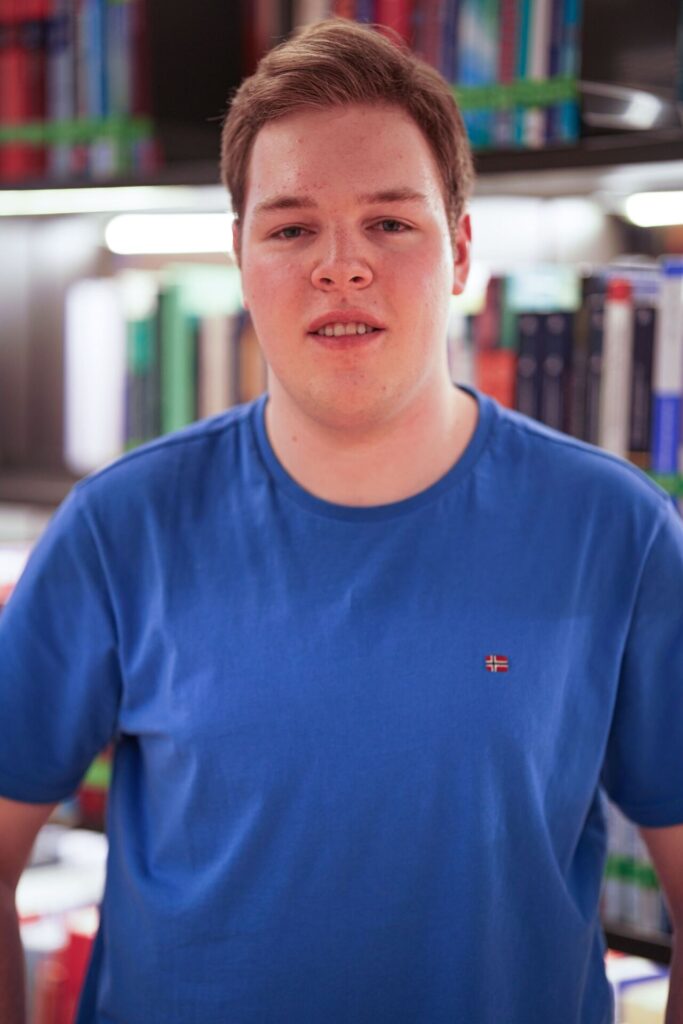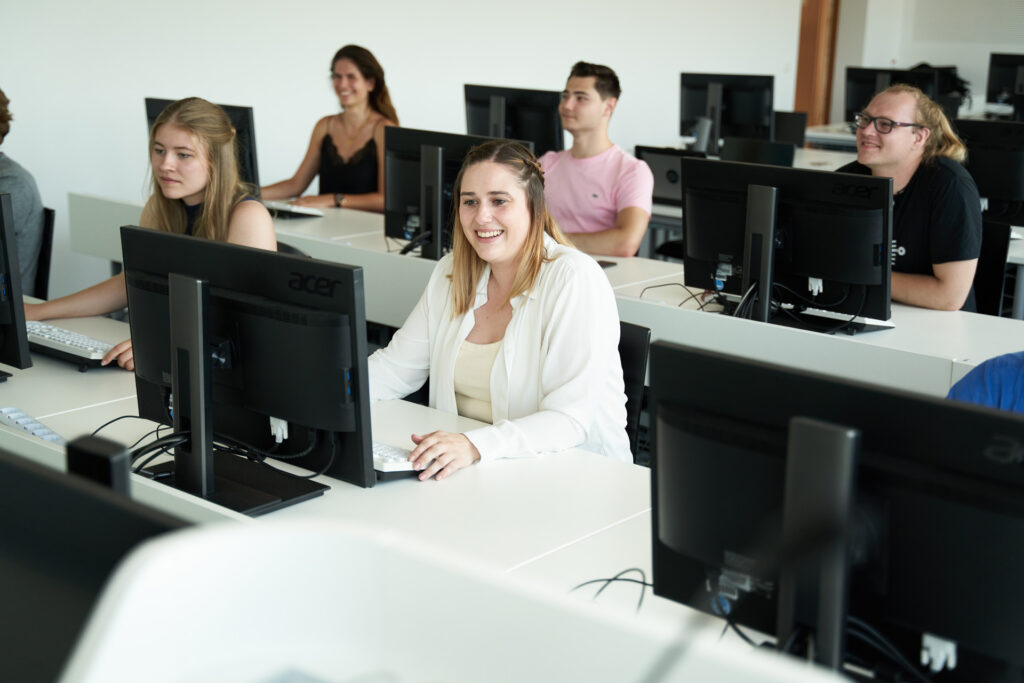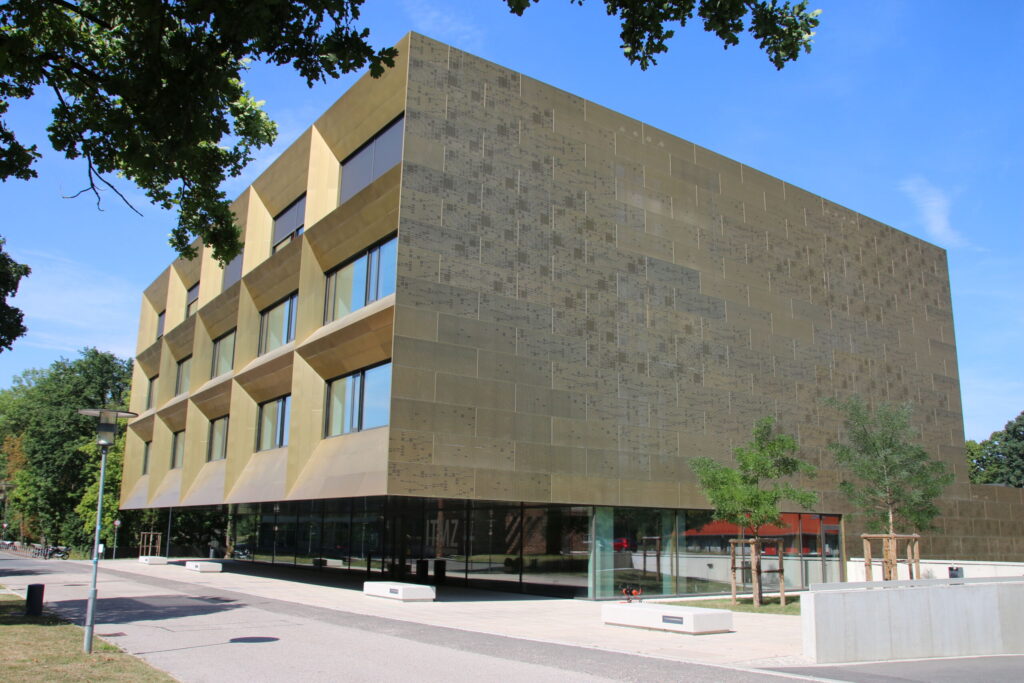Computer science
At a glance
Academic degree
Bachelor of Science (B.Sc.)
Form of study
Full-time
Standard period of study
7 semesters (incl. practical semester), 210 ECTS
Place of study
Language of instruction
German
Start of studies
Winter semester (October 1)
Admission requirements
University entrance qualification, entrance qualification for universities of applied sciences, vocational qualification or foreign educational certificate
Orientation semester
Individual modules can be taken as part of an orientation semester
Semester abroad
Possible as a theoretical or practical semester
Studying with a practice partner
Possible as a combined study program (PraxisPlus) or study program with in-depth practical experience (PraxisPlus)
Accreditation
accredited by the Accreditation Council
Registration
from 02.05. – 30.09.
Profile of the degree program
Studying computer science at Coburg University of Applied Sciences prepares you specifically for the demands of the IT world. You will acquire comprehensive specialist knowledge that will give you access to various industries.
![]() In addition to technical skills, great emphasis is also placed on developing your soft skills in order to further develop your personality.
In addition to technical skills, great emphasis is also placed on developing your soft skills in order to further develop your personality.
Prof. Dr. Volkhard Pfeiffer
Through specific projects with partners from industry and international contacts, you will gain practical and intercultural experience at an early stage. Students particularly appreciate the support at the beginning of their studies, the high level of expertise of the teaching staff, the personal contact and the close connection between the course content and practice.
What we value
Freely selectable course content
In the third and fourth as well as the sixth and seventh semesters, you can choose freely selectable subjects from a catalog of compulsory electives. This allows you to focus on your strengths and interests.
Study internationally
Coburg University of applied sciences and arts offers the opportunity to complete a study or practical semester abroad. To this end, Coburg University of applied sciences and arts maintains relationships with foreign partner universities. Further information is available from the university’s Study Abroad service.
Course content and procedure
Students spend around 20-25 hours per week in lectures, tutorials and practicals at the university. In addition, they have to invest further time in learning and deepening their knowledge independently. The examinations are spread evenly over the entire period of study. You therefore have an overview of your performance and academic success at all times.
1st study section (1st to 4th semester)
The first stage of study (1st to 4th semester) has the following fixed course content:
- Fundamentals of computer science and mathematics
- Core subjects of computer science, e.g. algorithms and data structures, programming, software engineering, database and operating systems, networks, microcomputer technology
3.+ 4. Semester
In the third and fourth semesters, you supplement your compulsory subjects with freely selectable subjects from a catalog of compulsory electives.
5th semester
The fifth semester is the practical semester.
6.+ 7. Semester
In the sixth and seventh semesters, you can choose any subject from a list of compulsory electives. This allows you to focus on your strengths and interests.
Examples of optional course content
Subjects are offered in various fields of computer science, e.g:
Software techniques
The focus here is on the design and creation of software and software-intensive systems. The range of subjects includes all innovative software technologies as well as techniques for designing software development processes.
These include:
- Web technologies
- Development of software for large complex systems
- Cryptography and IT security
Embedded Systems
Large computer systems consist of complex hardware and software. This specialization focuses on the optimal combination of hardware and software components.
Possible areas of application are
- Development of hardware and software, e.g. for the automotive industry (safety and driver assistance systems), hardware engineering
- Mobile computing such as programming mobile devices (cell phones, iPhone, wireless sensors)
Business informatics
This is about modern information systems that support companies in their business processes. This requires both business knowledge (e.g. cost and performance accounting, marketing and sales) and IT techniques.
Examples of applications are
- Use of standard operating software
- IT management
- Production and logistics
Computer graphics and computer vision
Computer graphics teaches and researches methods for the computer-aided generation of images. Computer vision is concerned with extracting information (such as a 3D model of the environment) from images. Basic algorithms and data structures of computer graphics and computer vision are covered and solutions are developed and researched in the following areas:
- Modeling, processing and storing complex scenes
- interactive computer graphics
- Basics of machine vision
- Parallel processing on graphics cards
Visual Computing
Visual Computing covers all areas in which images are digitally generated, analyzed, modified and processed. The course content includes:
- Computer graphics
- Computer Vision
- artificial intelligence
- Human-machine interaction
Practice during studies
Studying with in-depth practice (PraxisPLUS)
Studying with in-depth practical experience in the PraxisPLUS model offers you the opportunity to gain more practical experience during your studies – without extending the duration of your studies. The prerequisite is a work contract with a company/institution.
You can apply your knowledge from the lecture directly at work. The work in the company is remunerated. This in turn makes it easier to finance your studies.
Job & Career

Computer scientists have a wide range of opportunities in the IT world. They find exciting jobs with hardware and software manufacturers, but also in industrial companies, banks, insurance companies and public authorities.
Typical fields of activity are
- Software and hardware development
- System and application development in technical and commercial areas
- System analysis and IT organization
- Support for complex IT systems and networks
- IT consulting for the optimization of business processes
- Distribution of IT solutions
In the field of software engineering, for example, you will work on system analyses, web developments or the support of IT systems.
In Embedded Systems, you will work in the automotive industry, medical technology or manufacturing industry.
Business IT specialists combine business administration and computer science, for example in the planning and maintenance of business information systems or in IT consulting. In computer graphics and computer vision, you will find roles as a software developer, software architect, data scientist or algorithm developer.
Do another master's degree!
After successfully completing their Bachelor’s degree, good graduates have the opportunity to gain further qualifications with a Master’s degree. Coburg University of applied sciences and arts offers Master’s degree courses in Electrical Engineering and Information Technology and Development and Management in Mechanical and Automotive Engineering. They follow on directly from the Bachelor’s degree course.
You can also find an overview of which Master’s degree programs you can combine with your Bachelor’s degree here.
Curriculum and examination regulations
The module plan shows the distribution of subjects over the seven-semester course. The module manual provides an overview of the course content. The study and examination regulations forms the legal basis of the degree program. Questions about the content of the course can be answered by the course advisor Prof. Dr. Dieter Wißmann.
Podcast: Studying computer science - prospects for students and companies
You are currently viewing a placeholder content from YouTube. To access the actual content, click the button below. Please note that doing so will share data with third-party providers.
More InformationStudy Ambassador

I’m Moritz Zerr and I’m a student ambassador for Computer Science. As I study at Coburg University of applied sciences and arts, I can answer your questions directly. So if you want to know what the degree program is all about or what it’s like to live in Coburg, just send me an e-mail: moritz.zerr@stud.hs-coburg.de




